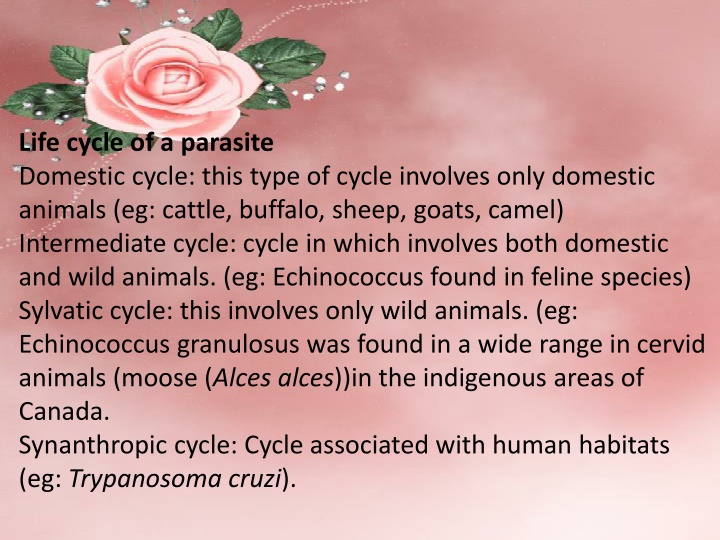
The Complexity of Parasite Life Cycles
Explore the different cycles of parasites in domestic, intermediate, sylvatic, and synanthropic environments, along with the factors influencing parasite behavior and patterns. Learn about host specificity, immunology, and immunity against parasites.
Download Presentation

Please find below an Image/Link to download the presentation.
The content on the website is provided AS IS for your information and personal use only. It may not be sold, licensed, or shared on other websites without obtaining consent from the author. If you encounter any issues during the download, it is possible that the publisher has removed the file from their server.
You are allowed to download the files provided on this website for personal or commercial use, subject to the condition that they are used lawfully. All files are the property of their respective owners.
The content on the website is provided AS IS for your information and personal use only. It may not be sold, licensed, or shared on other websites without obtaining consent from the author.
E N D
Presentation Transcript
Life cycle of a parasite Domestic cycle: this type of cycle involves only domestic animals (eg: cattle, buffalo, sheep, goats, camel) Intermediate cycle: cycle in which involves both domestic and wild animals. (eg: Echinococcus found in feline species) Sylvatic cycle: this involves only wild animals. (eg: Echinococcus granulosus was found in a wide range in cervid animals (moose (Alces alces))in the indigenous areas of Canada. Synanthropic cycle: Cycle associated with human habitats (eg: Trypanosoma cruzi).
Parasitic diseases behavior and pattern Many diseases included parasite infection does not occur randomly in a group or animal or in herd or in country or an area. There is always driving factors that manipulate the diseases existence in a population could be associated with the agent, host, ecological variables. These factors cause persisting the agent in the population as long as would never be controlled thereafter, including: Individual characterization Population characterization Incubation period Pathogenicity and virulence Herd immunity and vaccination approval Parasite diseases by time Parasite disease by place
GENERALLY: Many parasites are now being shown to change host behavior. Growing number of scientists believe that many ecological studies need to include Parasitology as component as much animal behavior can be explained by level of parasitism. Especial behavior of some insects harboring larval stages of parasites, bird behavior in response to both ectoparasites and densities of some intestinal worms.
QUESTION QUESTION IN YOUR LIFE SPAM, IN YOUR LIFE SPAM, ARE YOU INFECTED WITH ANY PARASITES, WITH ANY PARASITES, AND WHAT IS THAT, THAT, HOW YOU TREATE IT, HOW YOU TREATE IT, WHAT IS THE CAUSITIVE AGENTS FOR THIS THE CAUSITIVE AGENTS FOR THIS INFECTION??? INFECTION??? ARE YOU INFECTED AND WHAT IS WHAT IS
HOST SPECIFICITY Some parasites have specific host that only infect specific animals, which often sensitive to body temperature or other environmental conditions as well as another might attack any host available such as fleas. IMMUNOLOGY The study of immunology, a broad field encompassing both research and clinical applications, deals with antigens, antibodies and cell- mediated host defense functions, especially as they related to immunity disease, hypersensitive biological reactions, allergies and rejection of foreign tissues.
IMMUNITY AGAINST PARASITES Parasites possess three major characteristics that make them difficult for a host to control immunologically: their size, their elaborate life cycles and their antigenic complexity. The Protozoa are most have complex life cycles and the various stages of either antigenically distinct, as in the malaria parasites, or variable as in the African trypanosomes. Protozoa inhabit the gut, blood or other tissues, including macrophages and the immune responses elicited are more appropriate to the site of infection than to the nature of the parasites themselves.
In the helminthes infestation, the nature of the surface of the worm, which is the part available for immune stimulation and attack is important. In Digeneans and Cestodes it is the tegument of the worm that is exposed while in nematodes the outer surface is a protective cuticle, the antigenic nature of which may vary during the life cycle. Like protozoa, different Helminthes occupy different sites usually the gut, but sometimes the blood or other tissues and the immune response is again more appropriate to the site of infection than to the actual parasites. A further complication in helminthes infections is that during it's life cycle that worm may not only change its form but may also change its site of infection several times. In Ascaris lumbricoides infections, larvae pass through various internal organs before maturing in the gut, the net result of these variations in the expression of antigens and frequent changes in site of infection is that the immune responses elicited may be against antigens that are no longer present or in places where the parasites no longer live.
PARASITISM ASPECTS Each animal can be a host of many parasites; thus, there are far more parasitic organisms on earth than there are non parasitic organisms. It has been estimated that more than 50% of all living plants and animals are parasitic at some stage during their life cycle. VETERINARY IMPORTANCE OF PARASITES A poultry farmer can be wiped out by Coccidia. Cattle, pigs, and sheep infected with parasites fail to gain weight and may not reproduce. Dogs may become infected with heartworm and die if untreated. Cats are infected by many species of protozoans and helminthes. In Africa, cattle cannot be raised in an area equal to that of the U.S. due to trypanosomes.
